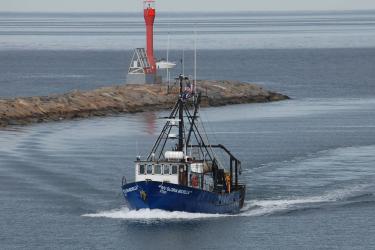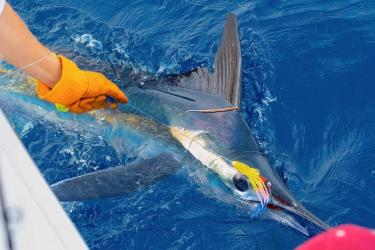Beth Sharack is a Chemist for the Habitat Ecology Branch located at our Sandy Hook Laboratory in New Jersey. She does field research, analytical chemistry and community outreach.
1. Can you tell us about your science journey, your career in science?
Today, girls are directed into STEM classes where they’re empowered to excel in math and science. I was born in the 1960s, a time before the Women's Movement was fully formed and girls were often steered towards classes like home economics or typing. So, what made me interested in the field of Marine Biology? I can’t say that I had some sort of science epiphany in school; it was simply my love of the ocean. Growing up, I spent as much time as I could at the Jersey Shore. My obsession, and my mother’s fear, was when I would hold my breath as long as I could while swimming beneath the waves. I was trying to see and explore as much as possible. Like many other kids in the 60s and 70s, I watched The Undersea World of Jacques Cousteau, a documentary television series about marine biology and exploration. Through this, I became aware of environmental concerns and the vast complexity of ocean ecosystems.
Unlike many of my colleagues, I started in science before finishing my degree. I was in my senior year at Rutgers University majoring in biochemistry when I was offered a full-time job at the science center’s Sandy Hook Laboratory as an independent contractor working as a research technician in the organic chemistry lab. This was a difficult choice. I fully intended to complete my degree, even though I worked a second part time job and clocked in at 60 hours per week. What prevented me from earning my degree at Rutgers University was that some of the required courses weren’t offered at a time when I could take them. Ultimately, it was the project I was working on that inspired me to continue my studies and research. We were engaged in a multi-disciplinary study evaluating how the closure of an ocean dumping site 12 miles off of Sandy Hook might affect living marine resources and their habitats. I could make a difference right in my backyard! I was fortunate at such an early point in my career to have the opportunity to work with a team of scientists from different fields. It gave me valuable experience and knowledge and in 1993, after the birth of my daughter, I became a full-time federal employee at the Sandy Hook Lab and later I earned a Bachelor of Science degree (biology) from Monmouth University while working full time and raising my daughter as a single mom.
2. Could you share an example of a hurdle or obstacle you experienced during your science journey and how did you overcome it?
As a young woman in a male-dominated field, I found it necessary to teach myself things without the help of a mentor. This was true of both life inside and outside of the lab. When I took my first federal position in the inorganic chemistry lab, I was given no direct training. I learned how to prepare standards and samples for analyses on instruments that identify and measure trace and heavy metals. As is the case in many labs, some of the instruments I used were outdated and I was often faced with troubleshooting and performing adjustments to keep them working. It was through my own research, trial and error, and actively reaching out to others for advice that I was able to keep these instruments running. This gave me the confidence to face new challenges throughout my career. Women face unique challenges in the scientific community. I struggled getting my degree while being a single mom and working full time. Later I became a foster parent and my family grew from two to six. In the end, it was all worth it!
3. What has been your biggest career and/or personal achievement?
While I have co-authored papers and been the lead investigator for two different chemistry laboratories, what I consider my biggest achievement is my contribution to the growing body of knowledge about the impact of microplastics on the environment. I study the effects of microplastics on shellfish. We know that contamination is prevalent, but we don’t know how bad it is. On a more personal level, sharing what our lab does, why our research is important, and how people can contribute to a healthier environment makes me very happy. I do this through a couple of different outreach efforts including, lab tours, school visits, our annual Open House, and by creating interactive exhibits and programs designed to engage students with science topics like climate change, microplastics, wind energy, marine chemistry, and early life history of fish. For some groups, like Big Brothers Big Sisters, I include a beach seining activity to demonstrate how scientists identify marine species and collect data.
4. What advice would you give young women about a career in science?
I’d advise women interested in a science career to bond with each other and support each other as they advance in their careers. Women in any profession, be it the private or public sector, face challenges which are specific to them. Develop a network of colleagues — it’s a valuable resource to women in the sciences. Don’t focus on making this network a competition with men; focus on creating a matrix of women-centric relationships. At every level of science — from research technician to Ph.D. — there’s something to be gained from women working with and supporting each other.



